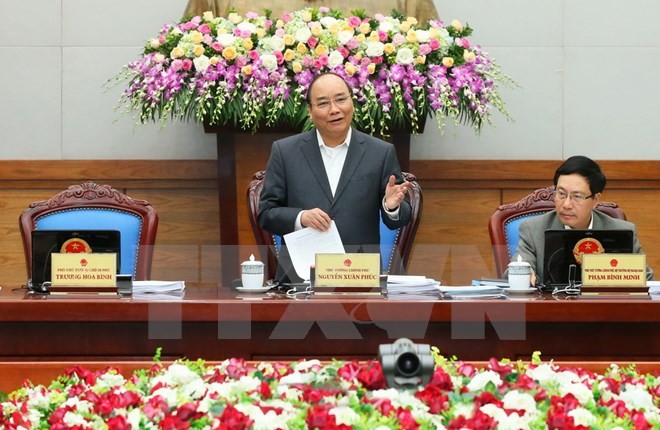(VOVworld)-Vietnam will have to achieve a GDP growth of at least 7.1% in December to meet the expected GDP growth of between 6.3% and 6.5% for the year. The Government has vowed do its utmost to meet this challenge.
Vietnam is encountering numerous economic difficulties, including fluctuations in the forex market and rising inflation, which was close to the maximum acceptable level of 5% in November.
Boosting production and controlling inflation
One of the key solutions is to increase exports by at least 8% in the final month of 2016. Head of the Government Office, Minister Mai Tien Dung stressed the need to try to keep inflation from rising beyond 5%. Prices of commodities need to be closely monitored to ensure market stability before the lunar new year holidays, while the State bank is required to take measures to counter any major forex fluctuations at the end of the year.
 |
Prime Minister Nguyen Xuan Phuc (standing) chairs the Government's November meeting
(Source: VNA)
|
The Ministry of Finance has been asked to report to the Prime Minister in December the status of Vietnam’s public debt and the roadmap to implement the Party Poliburo’s resolution on restructuring the state budget. The State Bank will fine-tune the legal framework to address bad debts, while securing the rights and interests of depositors and minimizing risks for the domestic banking system.
Pushing up budget collection and credit growth
Deputy Finance Minister Huynh Quang Hai told the Government’s November meeting that revenues so far this year have risen 6.3% but serious challenges remain as crude oil prices continue to sag.
“Our ministry will adopt more incentives to boost production, intensify the battle against trade fraud, smuggling and fake products, and accelerate the disbursement of capital. We will also tighten regular budget spending”, Mr. Hai said.
Deputy Governor of the State Bank Dao Minh Tu said the current credit growth of 14% will meet all economic development demands, and help control inflation and bad debts.
“Traditionally, credit has grown sharply by year end. Capital will mainly be allocated to key areas, particularly to respond to the aftermaths of natural disasters and environmental pollution, and create added values”, Mr. Tu said.